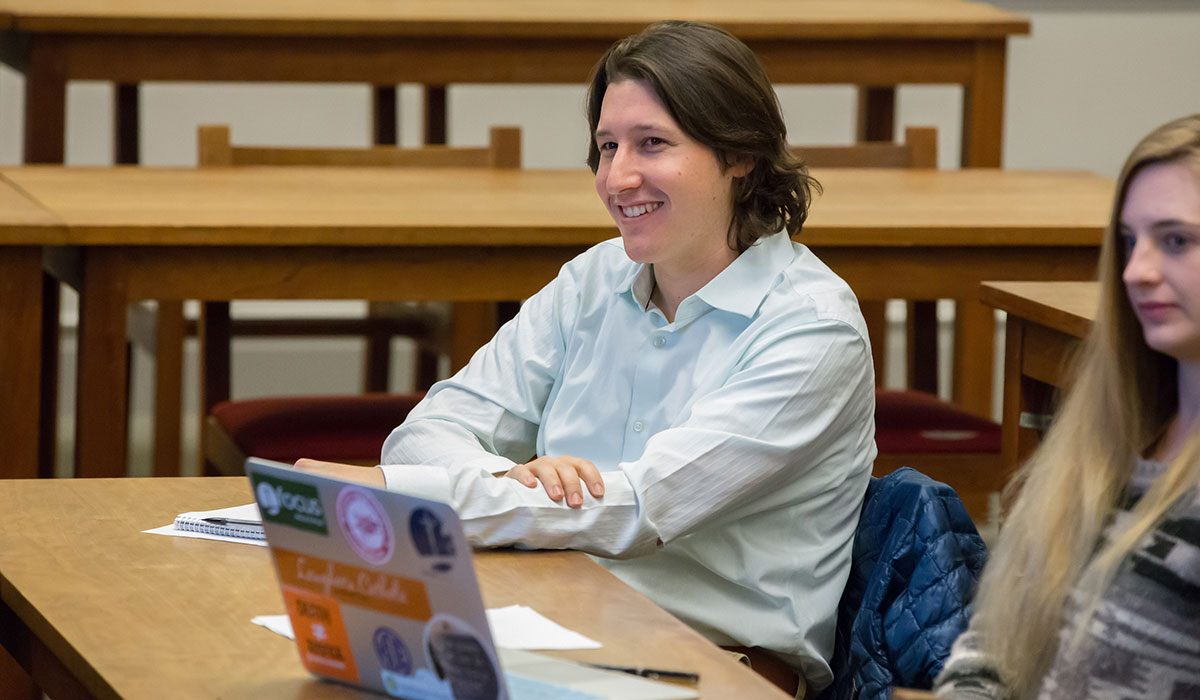The 4+1 Bachelor to Master of Science in Library and Information Science (M.S.L.I.S.) Program is designed for undergraduate students to begin working towards a master’s degree in library and information science while completing their bachelor’s degree. Students in this program will take four, 3-credit, 500-level graduate library and information science courses during their undergraduate career and count those 12 credits toward the bachelor’s degree and the M.S.L.I.S. degree. The M.S.L.I.S. program requires a total of 36 credits, so only 24 more credits (8 LIS courses) will be needed at the graduate level to earn the M.S.L.I.S. degree. These eight courses can be completed in one year and cover a variety of disciplines within library science, such as Cultural Heritage, Law Librarianship, and more. The program is open to juniors and seniors of all majors.
The Library and Information Science Program
An M.S.L.I.S. degree is highly relevant for today’s 21st century information needs. Our graduates assist users and organizations in finding information, making sense of it, and using it to support decision making. The roles of information professionals are expanding and becoming more stimulating and rewarding than ever.
Graduates of the M.S.L.I.S. program might find themselves employed in a variety of library settings. They may work for special libraries serving government agencies, businesses, non-profits, or organizations that make intensive use of information, such as think tanks. They may work as reference librarians, archivists, managers of information systems, and digital librarians who manage data and information on the Internet. Others may work in academic libraries and K-12 school libraries.
Admission
Two applications are required:
- Application to participate in the B.A./M.S.L.I.S. (B.S./M.S.L.I.S.) program should be filed by the end of the sophomore year;
- Application for graduate studies should be filed in the fall of the senior year.
GPA requirement:
A minimum cumulative Catholic University grade point average of at least 3.5 is required.
Application procedures: The application for the B.A./M.S.L.I.S. (B.S./M.S.L.I.S.) program requires approvals of the department chair, the associate dean of graduate programs, and the associate dean for undergraduate programs. This application must include a list, compiled with the major department, of a maximum of four courses that may be taken for both undergraduate and graduate credit. Any subsequent change in these designated courses requires the approval of the department chair, the associate dean of graduate programs, and the associate dean for undergraduate programs. In addition, courses for such "double" credit must be so designated before the beginning of the semester in which they are taken. The application for graduate studies requires the same procedure required of regular graduate applicants.
Approval of applications: The application for the B.A./M.S.L.I.S. (B.S./M.S.L.I.S.) requires approval by the faculty of the major department (appropriate procedures will be established by the department) and by the associate dean of graduate programs and associate dean of undergraduate programs. These approvals are subject to review of academic progress at the end of the junior year. The application for graduate study requires approval by the major department and the associate dean for graduate programs. Any approval will be provisional, subject to review of the student’s academic record in the junior and senior years.
B.A./M.S.L.I.S. (B.S./M.S.L.I.S.) requirements: All academic regulations remain in effect. The student must complete all requirements for both the B.A./B.S. and the M.S.L.I.S. degrees. Ideally, students take one (1) graduate course per semester, for each of the four (4) semesters of the junior and senior years. No student enrolled in this program may take more than two (2) graduate courses in one semester while completing the B.A. or B.S. requirements.
Time limitations: The B.A./B.S. must be completed no later than four years after matriculation. The M.S.L.I.S. must be completed no later than five years after matriculation (i.e., one calendar year after the B.A./B.S. is received. Students are encouraged to take two graduate courses in the summer after receiving the B.A./B.S.). No leave of absence or extensions of this time limit will be permitted. A student who fails to complete all requirements for the M.S.L.I.S. within this time may not count the designated courses toward the graduate degree. (Assuming satisfactory progress, such a student may continue in the M.S.L.I.S. program.)
Record keeping: The undergraduate office maintains records pertaining to the B.A./B.S. The undergraduate office provides to the graduate office grades in courses which are taken for both undergraduate and graduate credit. The graduate office maintains records pertaining to M.S.L.I.S. requirements.
GPA/Class Standing: The undergraduate grade point average (which is printed on the transcript and used to calculate class standing) includes all Catholic University courses taken prior receiving the B.A./B.S., including the "double" B.A./M.S.L.I.S. (B.S./M.S.L.I.S.) courses. However, courses taken only for the M.S.L.I.S. are not included in the undergraduate GPA, even if these are completed prior to awarding of the B.A./B.S. degree.
Program Structure
Students will choose four of the six 500-level courses to begin their entry into M.S.L.I.S. program. After students have earned 12 credits from these courses, they will work with their advisors to select the remainder of their courses and a practicum. The 500 level LIS courses include:
- LSC 522: Digital Content Creation and Management
- LSC 524: Actionable Intelligence
- LSC 525: User Interface Design and Evaluation
- LSC 527: Introduction to Data Science
- LSC 551: Organization of Information
- LSC 553: Information Sources and Services
- LSC 555: Information Systems in Libraries and Information Centers
- LSC 557: The Information Professions in Society
- LSC 563: Data Visualization
- LSC 565: Data on the Web
For more details on these classes and the elective classes, please see the Course Catalog.
For more information, please contact Dr. Sue Yeon Syn (syn@cua.edu).

